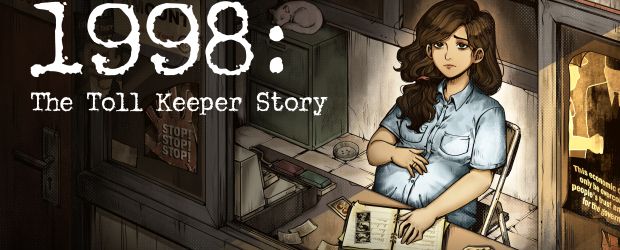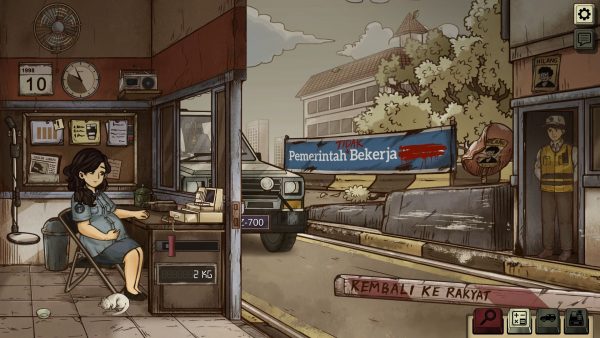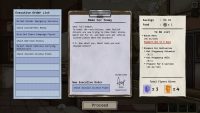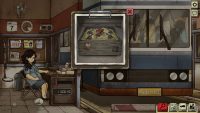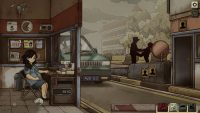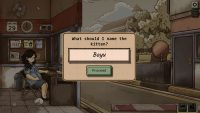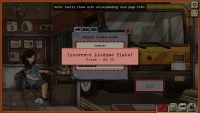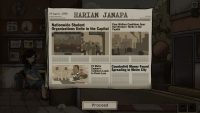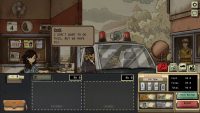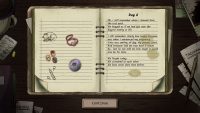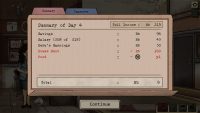Switch to: German
In 1998: The Toll Keeper Story, we experience a violent unrest inspired by the events in Indonesia in the role of a pregnant toll booth worker.
It is the end of April 1998, and unrest is spreading throughout the fictional country of Janapa after mass layoffs and soaring inflation causes the cost of living to skyrocket. The population, particularly students, are rebelling in the capital, Metro City, and their protests are being violently suppressed. A young couple, Dewi and Heru, are expecting their first child. Dewi is trying to make ends meet at a toll booth on the outskirts of Metro City to cover the costs of a healthy birth, while her husband is smuggling protesters into the city in the hope of giving their daughter a better life.
The game was developed by GameChanger Studio, based in Tangerang, Indonesia, and it is based on the Indonesian riots of May 1998 (also known as Peristiwa 98), which claimed the lives of more than 1,000 people. The story is advanced through newspaper articles, which depict the escalating violence and how the state apparatus attempts to downplay the events. At the toll booth, we can influence the events to a certain extent. The shift has a fixed length, but the tasks become increasingly varied. While initially we only have to determine the correct vehicle class, occasionally get to pet our cat, which we can name ourselves, listen to the handful of songs on the radio, and collect the appropriate toll, the regime becomes increasingly restrictive. Soon, we are instructed to turn away small vehicles carrying demonstrators and to collect fines for smuggled goods (we use a metal detector to detect firearms, knives, and explosives), overweight vehicles, discrepancies in paperwork, and worn or fake license plates. If we discover counterfeit money with an UV lamp, a fine doesn’t suffice, and we are obligated to call the police.
The game uses mouse controls, controllers are not officially supported. While operating the cash register is quite intuitive and can be supplemented with a helpful change display and a rather superfluous calculator for an additional fee, the daily addition of further restrictions necessitates various submenus, for example, to check the weight table or to inspect documents. Although we can at least hide the cash register to check the license plate, the overall menu design seems too convoluted, and some additional comfort features are more than welcome.
To raise the necessary funds for a C-section, pregnancy vitamins, and pregnancy milk, we can earn some extra cash by selling flyers for the regime or for the protests. Watch out and don’t hand a flyer for the student movement to the wife of an official of the authoritarian regime or she’ll denounce you. On the other hand, we can also use our income to help those in need make ends meet or escape. If we turn away the captain of the Metro FC football team for not paying the toll, as per the rules, the newspaper will report on the team’s defeat the following day. If we overlook something—whether intentionally or not—the cost will be deducted directly from our wages. Since the rent is also steadily increasing, we have to manage our income carefully, and the game presents us with some tricky moral decisions.
Dewi automatically engages in occasional chats with some characters, such as her best friend Sinta, whose dramatic story is told in short visual novel sequences. As a spark of hope in the dire setting, despite different religions and cultures, the two stick together through thick and thin, which Dewi records in her diary. Here, we can also add a few stickers ourselves, but we don’t have much influence on the overall narrative. We can easily miss or accidentally skip the dialogues at the toll booth due to following the toll collection process we learned. This is a shame, considering the high quality of the dialogues. The interface could use some adjustments to prevent this from happening. As the game progresses, the world around us visibly changes. Barbed wire fences appear, protest slogans are scribbled on walls and barriers, and the city becomes increasingly littered. Environments and characters are beautifully drawn, and the events are underscored by the appropriate music and sound effects. Based on the placeholders in the cutscene replay theater, we assume that there are at least four different endings. To reach the good ending after around three hours of play, all you need to do is to balance out your decisions between the benefit to your own family and to society. The game has been available on Steam for PC since October 28th for €11.79/£9.99/$11.99 with a limited-time 18% launch discount, in English and Indonesian.
Final thoughts
1998: The Toll Keeper Story tells the emotional story of a pregnant mother, inspired by the true events during the 1998 Indonesian riots. The game presents us with interesting moral choices, not in the form of plain text boxes, but in our actions. Do we add another 20 Rb of our own, or do we send the bus full of protesters back due to the lack of money? Will we have enough money for the rent at the end of the week? Why should we only turn away small passenger cars with protesters and not larger vehicles? How do we treat our own partner if they join the movement? And when will our creepy supervisor, who constantly harasses us in the numerous instructions, finally be held accountable? The regime’s repressive action against its citizens seems arbitrary, and it’s up to us to decide which rules we can and want to enforce and in which cases. We don’t just read about the consequences of our actions in the newspaper; they drive up to our toll booth every day. The somewhat convoluted menu design could be improved to further enhance the gameplay experience and prevent players from accidentally skipping any of the dialogues. We would have liked to spend more time with individual characters to learn more about them than in the short conversations at the toll booth and in the brief visual novel scenes between workdays. We highly recommend 1998: The Toll Keeper Story to anyone who enjoys games like Papers, Please or Not Tonight.
GameChanger Studio provided us with a PC copy of 1998: The Toll Keeper Story, which we used to capture the screenshots.

